Spot Cooling for Industrial Lasers & Optics
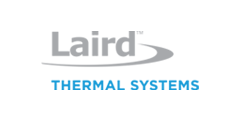



Introduction
With an increasing demand for advanced industrial manufacturing, laser systems have become the most important fabrication tool. While high powered lasers such as CO2 lasers are used for coarse cuts of metals, ultrafast lasers are used for fine cuts and polishing of semiconductor materials. Fiber lasers have the versatility to do both. In today’s consumer electronics, electrification of vehicles and green energy are driving the need for advanced laser machining and additive machining of complex materials. This requires the use of a combination of laser types, sometimes running in parallel to accomplish coarse cutting, welding, fine cutting or polishing at high speeds.
A focused laser beam can generate a significant amount of heat. High-power industrial lasers can generate in excess of 10,000 Watts during operation of thick metals. Temperature control of the sensitive optics inside the laser needs to be maintained to achieve peak performance. Changes in temperature can distort the laser wavelength as it passes thru the optics, causing inefficiencies that can result in poor welds or sputtering. Compressor-based refrigeration systems have long been used to cool laser systems while thermoelectric-based chillers or coolers offer spot cooling for low power lasers and optical components. This application note will focus on how Thermoelectric Coolers can be used for spot cooling of industrial laser optics.
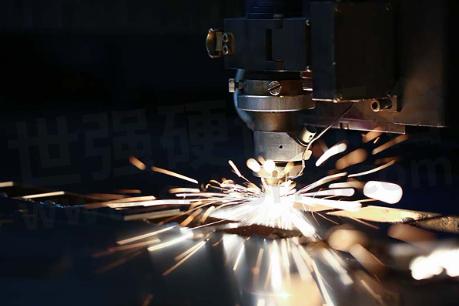
Thermoelectric coolers provide spot cooling
for high performance industrial lasers.
Application Overview
Laser systems are increasingly replacing CNC machines used in fabrication processes such as cutting, welding, drilling, and etching. Industrial manufacturers are looking for ways to reduce costs while increasing throughput and quality. Because laser systems are typically expensive, OEM’s need to justify the cost by reducing cutting or welding time, fabricating complex parts with unique pattern structures or producing parts with a high number of redundancies. In additive manufacturing, laser systems can create complex parts that cannot be made with CNC machines.
The main selection process for an industrial laser is based on the laser beam diameter and depth of cut it can achieve on the material the end user is processing.
Each market application requires a specific laser power range:
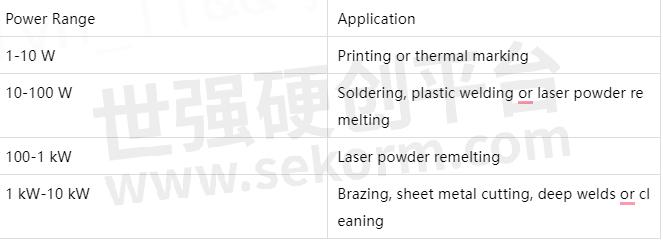
Excimer lasers are growing in popularity due to the growth of OLEDs used in consumer electronics for handsets, laptops and TV’s. OLED screens can have more than 30 layers and require a laser for removing or anneal each layer. Demands for fiber lasers are also increasing due to their versatility. These lasers use hundreds of laser diodes, which provides the scalability to control the power of the laser beam. In addition, fiber lasers offer higher beam quality, efficiency and are more cost effective than traditional CO2 lasers.
Industrial lasers systems larger than 10 Watts typically require some kind of active cooling. Large systems (more than 500 W) typically require an external compressor-based chiller and smaller systems (less than 500W) normally use a thermoelectric-based chiller or thermoelectric coolers. Internal optical components also require temperature control to ensure optimal laser performance. Depending on the material of the optics, these components need to be kept at a nominal temperature between 20 to 35℃ with a temperature stability of ± 0.5°C. In addition, thermoelectric coolers are installed inside laser diodes used in fiber lasers to keep the temperature of the laser diode stable while ambient temperatures fluctuate.
Future laser applications will bring new challenges to laser fabrication. They are expected to come from market applications in quantum technologies, printing of organs, lower cost manufacturing for customized single-piece processing and very large-scale processing. Some of these applications will require a more customized light control by tailoring the energy to the laser for improved energy deposition. New wavelengths will be required to improve process efficiencies, such as ultrashort high-power UV lasers and ultrashort far-infrared lasers. For high volume production, multiple beam processing will be required.
Application Challenges
As a laser beam’s energy passes thru an optic lens it can increase its temperature and distort the wavelength of the laser beam. Thermoelectrics are often used to absorb the heat from the laser beam as it passes thru the lens and pump it out to the hot side heat exchanger. The cooling capacity of the thermoelectric cooler needs to exceed the energy being absorbed by the lens plus parasitic heat losses caused by thermal shorting. The heat is then rejected by the thermoelectric cooler and dissipated by a heat exchanger. This can be either a direct conduction path to the case or for higher heat loads, a cold plate heat exchanger. When the lens temperature is stable, the cooling power requirement is typically low.
Thermoelectric coolers can be mounted onto the side of the lens or the fixture holding the lens. To maximize thermal conductivity, thermal interface material should be used on either side of the module during assembly. However, standard thermal interface materials, such as greases can outgas and contaminate the lens. Special thermal epoxies and phase change materials with low outgassing characteristics can be used, but to make sure all outgassing has been released, they need to be baked in oven prior to installation. An alternative mounting method is to specify thermoelectric coolers with metallized surfaces and low temperature solder. In this case, InSn solder is typically used, which melts at a temperature below the solder construction of the thermoelectric cooler. The difficulty with soldering is to minimize flux residue as this can also outgas and contaminate the lens.
For lasers with a footprint smaller than 100 x 100 mm, thermoelectric coolers are often mounted directly onto the exterior of the laser for temperature stabilization. Thermoelectric coolers for laser cooling often have a high heat pumping density per square area to match the heat generated by the laser. Typically, these thermoelectric coolers have heat flux densities of up to 13 Watts per cm2. Thermoelectric coolers operating at these levels often exceed the ability of a heat sink and fan to dissipate heat into the surrounding environment. An ambient liquid cooling system and cold plate is a better option as it can minimize laser space constraints, while routing heat out to an area where there is more space to exhaust heat into the ambient environment. One or multiple thermoelectric coolers in an array can be used to pump greater heat loads. For multiple arrays it is important to lap surfaces of the module so the thicknesses are within tight tolerances during mounting to the heat exchanger. This assures minimal air gap between the thermoelectric coolers and the heat exchanger.
It is also important to protect laser electronics against condensation. Even for applications where the set point temperature is at 20℃, the cold side of the the thermoelectric cooler can be at 10℃ or colder to maintain that set point temperature. This will most likely be below the due point temperature and cause moisture in the air to condense. Sealing the perimeter of the thermoelectric cooler with epoxy or RTV is not sufficient and it is therefore recommended to have a second insulation barrier to protect the thermoelectric cooler cavity. All surfaces that go below dew point will require some type of insulation to keep moisture from condensing. This is usually a close cell foam or other type of insulation that does not absorb moisture and has good thermal insulating properties.
Thermoelectric coolers can also be used in dehumidification applications in high power lasers. For these applications large recirculating chillers are used to absorb heat generated by the laser and power supplies that power the laser. However, in high relative humidity environments it is possible for moisture to condense onto cold plate surfaces, which can cause a field failure to the power supply. To minimize this risk, a thermoelectric cooler assembly can be used to lower the relative humidity inside the laser. The cold side heat sink will condense the moisture in the air and route it away from the power supply and other optoelectronics inside the laser.
Laird Thermal Systems Solution: UltraTEC™ UTX Series
Ideal for spot cooling on industrial laser applications, the UltraTEC UTX Series utilizes advanced thermoelectric materials for higher heat pumping capacity compared to standard semiconductor materials. The UltraTEC UTX Series cooler offers a 10% boost in heat pumping capacity over standard thermoelectric coolers. It also features a higher thermal insulation barrier that delivers superior temperature differential with a ΔTmax of 72°C.
The largest model in the UltraTEC UTX Series has a heat pumping capacity of up to 296 Watts. Form factors can range from 25 x 25 mm’s up to 55 x 55 mm’s. The solid-state UTX Series thermoelectric cooler generates a lot of heat in a small area. For the larger heat pumping models, it is recommended to use a liquid heat exchanger on the hot side to dissipate heat into the surrounding environment.
The UltraTEC UTX Series cools well below ambient temperature and actively removes heat from sensitive electronics. With no moving parts, solid-state thermoelectric coolers significantly reduce maintenance and total ownership costs. Thermoelectric coolers offer high reliability, no operational noises and perform well in high-vibration applications.
Conclusion
Advancements in laser manufacturing processing enable new products in consumer electronics, electrification of vehicles and green energy. Complex manufacturing processes require advanced thermal management solutions to support heat removal and temperature stabilization of optics and lasers. Thermoelectric coolers provide spot cooling for laser optics and power sources to deliver robust, low-power and maintenance-free operation.
Because of its solid-state operation, thermoelectric coolers like the UltraTEC UTX Series provides low maintenance and long life operation. Through advanced break throughs in materials sciences, this product series offers a boost in performance over standard grade thermoelectric coolers and a higher coefficient of performance (COP).
Laird Thermal Systems UltraTEC UTX Series delivers 10% higher heat pumping capacity than standard thermoelectric coolers and is ideal for spot cooling of industrial lasers.
- |
- +1 赞 0
- 收藏
- 评论 0
本文由samsara转载自Laird Thermal Systems Official Website,原文标题为:Spot Cooling for Industrial Lasers & Optics,本站所有转载文章系出于传递更多信息之目的,且明确注明来源,不希望被转载的媒体或个人可与我们联系,我们将立即进行删除处理。
相关推荐
Laird Thermal Systems Produces a Wide Array of Thermoelectric Coolers, Assemblies and Temperature Controller Combinations Optimized for Incubator Chambers
Laird Thermal Systems introduces thermoelectric solutions for incubator chambers, emphasizing precise temperature control without refrigerants. The HiTemp ETX Series and SuperCool X Series provide efficient heating and cooling, crucial for cell culture in labs. These systems offer a compact, reliable, and low-maintenance alternative to traditional incubator thermal management.
针对投影激光器的热电制冷器:莱尔德热系统UltraTEC™ UTX系列,运行噪音低,能耗降低多达50%
热电制冷器可提供局部点冷却,以保证卓越的温度稳定性,从而保持激光器和光电子器件的峰值性能。由于其固态运行,像Laird Thermal Systems UltraTEC UTX系列这样的热电冷却器可实现低维护和长寿命运行。通过在先进材料科学方面的突破,与标准热电冷却器相比,该产品系列能够提供更高的性能和更高的性能系数。
Laird Thermal Systems Thermoelectric Coolers Offer a Solid-State Heat Pump Solution to Medical & Cosmetic Lasers
Medical lasers, used in various surgeries, require precise temperature control to minimize tissue damage and enhance recovery. Thermoelectric coolers efficiently manage this by dissipating heat, maintaining a stable 20±0.5°C temperature, and offer benefits like low maintenance and compact size, making them ideal for medical laser systems.
Laird Thermal Systems Launches the SuperCool X Series with Next-Gen Thermoelectric Cooling Technology
Laird Thermal Systems has launched a new high-performance thermoelectric cooler assembly series that utilizes next-generation thermoelectric coolers with advanced semiconductor materials. This enhancement boosts cooling performance by up to 10% over previous models.
【材料】最大温差72°K的UltraTEC™ UTX系列热电制冷器,泵热能力69至299W,适用于高功率激光系统
与标准半导体材料相比,Laird Thermal Systems的UltraTEC UTX系列采用先进的热电材料,具有更高的泵热能力,热泵容量提高了10%,系列中最大的型号具有高达299瓦的泵热能力,可提供更大的温差ΔTmax=72°K。
Laird Thermal SystemsLaunches the OptoTEC™ MBX Series, a New Line of Micro Thermoelectric Coolers for High-performance Space-constrained Optoelectronic Applications
Laird Thermal Systems launches the OptoTEC™ MBX Series, a new line of micro thermoelectric coolers for high-performance space-constrained optoelectronic applications. The latest design innovation includes a compact footprint, with the smallest model measuring just 1.5 x 1.1 mm and profiles as thin as 0.65 mm.
Thermoelectric Coolers
型号- 430478-502,HTX20-31-F2A-0909-11-W2.25,CP085-127-06-L1-W4.5,64979-501,UTX15-24-F2-5252-TA-W6,CP14-31-10-L1-W4.5,ETX7-3-F1-2020-TA-RT-W6,9360001-301,7050045-502,71061-504,ETX14-12-F1-6262-TA-W6,PCX SERIES,UTX6-24-F1-5555-TA-W6,HTX15-31-F2A-0909-TB-W2.25,SH08-28-05-L1-W4.5,PCX6-12-F1-4040-TA-RT-W6,CP14-71-10-L1-W4.5,ULTRATEC™ UTX SERIES,PCX8-12-F1-4040-TA-W6,9340006-301,PCX7-16-F1-4040-TA-W6,ETX4-7-F1-2323-TA-W6,71092-501,ETX15-28-F2-5252-TA-RT-W6,CP14-127-10-L1-W4.5,387007103,CP14-35-045-L1-W4.5,ETX4-7-F2-3030-TA-RT-W6,430705-503,387007106,387007227,387007108,HTX12-65-F2A-1312-TB-RT-W2.25,430874-503,71062-514,387007231,CP08-63-06-L1-W4.5,387007112,387007113,9350004-301,387007115,430052-501,387007117,MS5-257-10-15-11-W8,ETX2.5-12-F1-3030-TA-RT-W6,CP08-127-05-L1-W4.5,CP14-127-045-L1-W4.5,HITEMP ETX SERIES,430922-501,387007120,387007123,387007122,9320002-301,MS3-119-20-15-11-W8,ETX11-12-F1-4040-TA-RT-W6,MS SERIES,56760-505,ETX15-12-F2-4040-TA-RT-W6,MS2-192-14-20-11-18-11-W8,ETX6-12-F1-4040-TA-RT-W6,56590-502,SH10-23-06-L1-W4.5,71036-505,56610-502,MS4-108-10-20-11-W8,ETX4-12-F1-3030-TA-W6,430027-501,PCX12-248-F1-5040-TA-RT-W6,PT4-7-F2-3030-TA-W6,430848-502,OTX12-65-F2A-1312-11-W2.25,430848-504,PCX8-7-F2-3030-TA-RT-W6,MS2-068-14-14-15-15-11-W8,PCX,CP14-71-045-L1-W4.5,OTX20-66-F0-1211-11-W2.25,HTX,PCX5-16-F1-4040-TA-W6,56430-501,OTX19-23-F1N-0608-11-W2.25,HTX SERIES,UTX9-28-F2-4040-TA-W6,PCX15-7-F1-4040-TA-RT-W6,PT4-12-F2-3030-TA-W6,CP12-161-04-L1-W4.5,16506-302,PCX8-6-F1-2040-TA-RT-W6,430875-503,ETX4-3-F1-2020-TA-RT-W6,43280-503,66100-501,66156-505,71063-505,44440-501,71020-505,56550-501,MS3-052-10-17-11-W8,387004692,387005660,SH10-125-05-L1-W4.5,71012-506,ETX2.3-4-F1-1919-TA-RT-W6,ETX5-6-F1-2040-TA-RT-W6,387005662,ETX4-12-F2-4040-TA-RT-W6,387005663,387005664,387004697,387005665,387005667,387005669,OTX12-66-F0-1211-11-W2.25,430097-507,ETX2.6-12-F1-2525-TA-W6,387005671,MS2-102-22-22-17-17-11-W8,387005673,387005676,387005677,387005678,387005679,387005318,CP10-254-06-L1-W4.5,ETX9-3-F2-2525-TA-W6,CP10-71-05-L1-W4.5,430026-503,430511-504,56910-502,OTX20-66-F0-1211-11-EP-W2.25,387006650,387005681,56995-501,387006891,ETX6-19-F1-4040-TA-RT-W6,CP10-31-05-L1-W4.5,387006893,387005685,387005686,387006897,387006534,HTX15-30-F2A-0610-11-W2.25,OTX12-65-F2A-1312-TB-W2.25,RH14-14-06-L1-W4.5,ETX2-12-F2-3030-TA-W6,PCX8-6-F1-3518-TA-RT-W6,MS2-102-14-14-17-17-11-W8,387006784,UTX15-288-F2-5252-TA-W6,387005696,387006544,ETX4-12-F1-4040-TA-RT-W6,SH14-125-10-L1-W4.5,CP14-71-06-L1-W4.5,9340001-301,HTX12-18-F2A-0606-11-RT-W2.25,ETX,387006791,387006795,CP2-127-10-L1-W4.5,387006798,63604-511,PCX6-24-F1-5555-TA-RT-W6,CP14-199-06-L1-W4.5,OTX20-65-F2A-1312-11-W2.25,UTX,PCX5.6-19-F1N-3030-TA-RT-W6,ETX15-24-F2-5252-TA-W6,MS3-231-10-15-11-W8,SH14-125-045-L1-W4.5,POWERCYCLING PCX,62910-510,PCX24-128-F2-5555-TA-RT-W6,387005354,HTX15-65-F2A-1312-TB-W2.25,POWERCYCLING PCX SERIES,CP10-131-04-L1-TOW-W4.5,OTX08-18-F0-0505-11-W2.25,HTX12-18-F2A-0606-GG-W2.25,CP14-199-045-L1-W4.5,CP2-71-06-L1-W4.5,ETX4-6-F2-2143-TA-RT-W6,OTX20-68-F1A-1313-11-W2.25,OPTOTEC™ OTX SERIES,71212-502,CP SERIES,CP2-31-06-L1-W4.5,POLARTEC™ PT SERIES,63595-501,PCX4-4-F1-1515-TA-RT-W6,ETX8-12-F2-2525-TA-RT-W6,HTX12-65-F2A-1312-11-W2.25,OTX08-31-F1-0707-11-RT-W2.25,PT8-12-F2-4040-TA-W6,ETX4-12-F2-3030-TA-RT-W6,CP10-71-06-L1-W4.5,OTX08-66-F0-1009-11-RT-W2.25,CP14-17-10-L1-W4.5,ETX3-3-F2-1518-TA-W6,ETX11-12-F2-3030-TA-RT-W6,PCX4-7-F1-2020-TA-RT-W6,387004970,MS2-190-10-10-12-12-11-W8,387005700,ETX2.5-12-F1-4040-TA-RT-W6,CP10-127-06-L1-W4.5,9340002-301,MS2-065-04-04-11-11-11-W4,ANNULAR,9350007-301,71049-501,POLARTEC™ PT,387006926,PT4-12-F2-4040-TA-W6,387006928,387006927,PCX11-12-F2-3030-TA-RT-W6,RH14-32-06-L1-W4.5,MS2-051-22-25-22-25-11-W8,MS4-115-14-15-11-W8,ETX14-3-F1-3030-TA-RT-W6,SH14-15-06-L-W4.5,PCX7.5-13-F1-4023-TA-RT-W6,OTX15-68-F1A-1313-11-W2.25,CP2-127-06-L1-W4.5,ETX6-7-F2-3030-TA-RT-W6,OTX08-08-F0-0303-11-W2.25,PCX6-28-F2-4040-TA-RT-W6,44530-501,MS2-049-10-10-15-15-11-W8,16503-310,UTX8-288-F2-5252-TA-W6,ETX3-48-F1-1212-GG-W6,475010-313,ETX2.6-6-F1-1225-TA-W6,UTX6-19-F1-4040-TA-W6,430436-504,OPTOTEC™ OTX,UTX SERIES,387006832,387006834,387006836,387006837,9350006-301,387006839,HTX20-65-F2A-1312-11-W2.25,9380001-301,MS3-070-20-25-11-W8,MS2-192-14-20-15-25-11-W8,9340003-301,MS4-129-10-15-11-W8,PCX2-12-F1-3030-TA-RT-W6,ETX2-6-F1-1225-TA-RT-W6,ETX4-3-F1-1515-TA-RT-W6,387006845,387005514,387006847,387005515,387005516,ETX25-12-F1-6262-TA-W6,ETX1.6-12-F2-3030-TA-RT-W6,OTX12-66-F0-1211-TB-RT-W2.25,430023-507,9350001-301,HITEMP ETX,387004679,57180-501,CP10-63-06-L1-W4.5,71035-505,ETX SERIES,UTX8-12-F2-2525-TA-W6,430474-501,MS2-107-10-10-12-12-11-W8,UTX11-12-F2-3030-TA-W6,ETX8-12-F1-4040-TA-RT-W6,ETX6-3-F1-2020-TA-RT-W6,387004680,OTX SERIES,387004685,387005659,PCX15-128-F2-4040-TA-RT-W6,9320001-301,9350005-301,OTX15-31-F2A-0909-20-W2.25,PCX11-191-F1-3553-TA-RT-W6,OTX,PT6-12-F2-4040-TA-W6,57125-501,CP10-63-08-L-W4.5,MS2-049-14-14-15-15-11-W8,CP2-31-10-L1-W4.5,CP2-71-10-L1-W4.5,ETX2-12-F1-252
Laird Thermal Systems Offers Thermoelectric Coolers, Thermoelectric Cooler Assemblies and Temperature Controllers for Refrigerated Centrifuges
Centrifuges are crucial for separating mixtures in medical and food processing labs. They face thermal challenges like temperature stability and noise levels. Thermoelectric coolers, like those from Laird Thermal Systems, offer an efficient and reliable solution for precise temperature control in centrifuges, reducing power consumption and maintenance costs. Laird‘s CP Series and temperature controllers provide stable cooling capacities and accurate control, making them ideal for various centrifuge applications.
PowerCycling PCX Elongated Thermoelectric Coolers from Laird Thermal Systems Speed up PCR Testing
To improve temperature precision control in PCR devices, Laird Thermal Systems has developed an elongated series of PowerCycling PCX thermoelectric coolers.
How do Thermoelectric Coolers work?
Thermoelectric coolers, also referred to as Peltier Coolers, are solid-state heat pumps that require DC voltage to dissipate heat using the Peltier effect. A Thermoelectric cooler consists of an array of p-and n-type semiconductor materials that are soldered between two ceramic plates. During operation, electric current flows through the module to create heat transfer and a temperature differential across the ceramic plates resulting in one cold and one hot side of the Thermoelectric cooler.
【产品】莱尔德热系统提供具有高可靠性固态架构的低成本半导体制冷片产品组合,用于精确温度控制冷却或加热
莱尔德热系统(Laird Thermal Systems)在本文介绍莱尔德热系统提供多种半导体制冷片产品系列,可按冷却能力、温差、外形尺寸或热循环能力进行分类。
Laird Thermal Systems Launches PCX Thermoelectric Cooler Series to Increase Reliability of PCR Cycling
This paper mainly introduces the advantages of Laird Thermal Systems with regard to their PCX series Thermoelectric Coolers applications
Can I use thermoelectric coolers for heating?
Yes, thermoelectric coolers can be used for heating in certain applications. In fact, a thermoelectric cooler can be more effective than a resistive heater since it can utilize heat from the ambient temperature in addition to the heat generated from the cooler itself.
电子商城
服务
使用FloTHERM和Smart CFD软件,提供前期热仿真模拟、结构设计调整建议、中期样品测试和后期生产供应的一站式服务,热仿真技术团队专业指导。
实验室地址: 深圳 提交需求>
提供稳态、瞬态、热传导、对流散热、热辐射、热接触、和液冷等热仿真分析,通过FloTHERM软件帮助工程师在产品设计初期创建虚拟模型,对多种系统设计方案进行评估,识别潜在散热风险。
实验室地址: 深圳 提交需求>




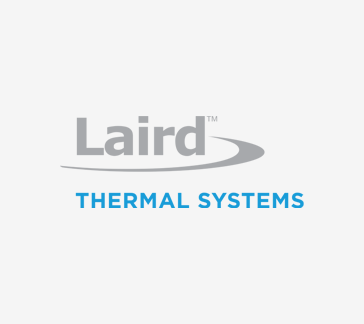








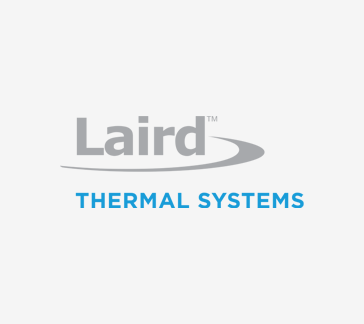























































































































































































登录 | 立即注册
提交评论